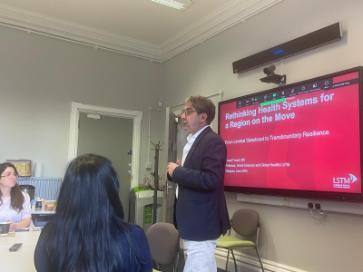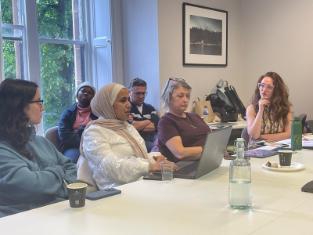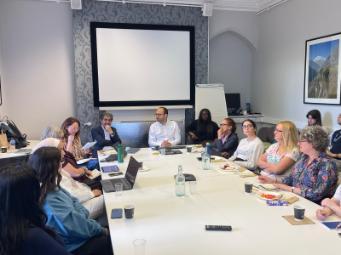EVENT RECAP | Delivering Health in a Region on the Move
Published: 25 August 2025
Our roundtable event, 'Delivering Health in a Region on the Move: Health Systems and Forced Migration in the Middle East' explored the complex intersection of health service delivery, displacement, and regional policy responses in one of the world’s most dynamic migration contexts, the Middle East.
Date: Tuesday 24 June
Time: 15.30-17.00PM
Location: Room 207, 10 The Square, University of Glasgow
On Tuesday, 24 June 2025, academics, practitioners, and policymakers convened for the event “Delivering Health in a Region on the Move: Health Systems and Forced Migration in the Middle East”, organized by Dr Asli Ozcelik Olcay, Senior Lecturer in Law, and Dr Molly Gilmour, Research Affiliate in Health and Wellbeing with support from the Peaceful, Secure & Empowered Societies IRT at the College of Social Sciences.
The session explored the complex intersection of health service delivery, displacement, and regional policy responses in one of the world’s most dynamic migration contexts, the Middle East. Bringing together interdisciplinary perspectives, the discussion addressed the legal, social, and structural challenges faced by health systems as they adapt to the realities of forced migration, while also highlighting innovative approaches to improving access and equity for displaced populations across the Middle East.
Opening Presentation was led by Dr Ibrahim Bou-Orm, Senior Lecturer in Global Health and Social Sciences, Liverpool School of Tropical Medicine, and Dr Fouad Fouad, Professor in Social Sciences and Global Health, Liverpool School of Tropical Medicine.

They reflected on the following key points:
- The integration of refugees into long-term public health planning remains an unresolved challenge. Health systems are statist and do not take into account the dynamics of forced migration.
- Traditional humanitarian models are designed to be temporary; however, displacement and migration often become protracted, challenging functionality
- Critical reflection is needed on the idea of "rebuilding" in politically fractured regions. What is truly being rebuilt—structures, systems, or trust?
- Many countries exhibit limited statehood, understood through a more traditional lens of the state's monopoly on power, where central authority is weakened or fragmented across regions. However, this does not necessarily imply an absence of governance or service provision — in fact, areas outside traditional power structures may be effective in delivering essential services through alternative forms of authority or localized governance.
- Syria exemplifies fragmentation: over ten years, it has operated under at least four different health governance bodies across its "power borders."
- The assumptions underpinning international policy—that populations don’t move, that governments are stable, and that institutions are coherent—often fail in practice.
- Lebanon offers a case of parallel systems:
- UNRWA for Palestinian refugees
- UNHCR for registered Syrians
- National system for Lebanese citizens
- Informal networks for unregistered Syrians
Following this, discussants shared their responses to the opening remarks by Dr Fouad and Dr Bou-Orm.

Dr Mhoira Leng
- Highlighted Uganda’s inclusive approach, where refugee and host communities (e.g., South Sudanese) co-designed chronic disease care.
- In contexts such as Gaza, emergency aid alone is insufficient; ongoing access to medications, especially pain relief, is critical.
- Health worker safety, fair remuneration, and education are not just practical needs—they are foundational to peace-building.
Frances Guy
- Emphasised that healthcare can be a bridge to peace.
- Historical perspectives are essential long term displacement not new, eg Horn of Africa. Potential to learn from situations like Iraqi Kurdistan, dealing with Syrian Kurdish refugees, and internally displaced Iraqis. e.g., displaced Iraqis arrived with central government issued ration books which enable detailed records of health treatment to be easily accessed, leading to collaboration between different ‘governing bodies’ on longer term health provision in an emergency context.
- Donors must be convinced of holistic needs—not just for "vulnerablised groups", but for all populations – must leverage practicing healthcare professionals, including dentists.
- Psychosocial care is critical. During her work in Northern Iraq, only two psychiatrists served the region.
Azza Abdelmoneim
- Shared insights from the NHS Voices project, supporting Arabic-speaking migrants navigating the UK health system.
- Trust is key: an NHS number was seen as a potential ‘tracking’ tool, requiring reassurance that NHS is not linked to immigration enforcement.
- Psychological care is not optional—particularly during maternity experiences, where assumptions about language and parenting can undermine care.
- Gaza today represents a failure of dignity in healthcare—no access to hospitals, midwives, or anaesthesia.
- Justice—not mere access—must be the goal of health provision.
Following the prepared remarks, the event opened to the floor for broader engagement and discussion, participants reflections are summarised:
- Myanmar’s fractured health system raised the question: can we envision people-led health systems over national or state-run ones?
- Dr Nicky Burns reflected on the movement of patients, drugs, and data—asking how systems adapt from global to individual care needs? Without trust, people may withhold vital information like intended destinations.
- With reduced funding and international retreat, how sustainable is universal health coverage (UHC) when national attitudes fear migration’s ‘burden’ on systems?
- Neutrality is being tested—e.g., in Taliban-controlled regions, perceived associations can threaten operations.
- Resistance to the overuse and applicability of concepts such as "resilience": At what point is a system deemed broken?
- Fouad asked: When 60% of Syrian refugees in Lebanon arrive with an NCD but only ‘emergencies’ are treated, how long before chronic conditions become crises?
- Proposals included cross-border funding mechanisms for international healthcare, and technical support without defaulting to repetitive policy recommendations.
- Frances stressed the need for community-led research, short, accessible (e.g. seven paragraphs, no paywall), and targeted toward meaningful action, not just publication.
To conclude, participants shared one final reflection to close the event:
- Azza: Educational support is essential—justice for healthcare students and professionals must be central to system strengthening.
- Mhoira: We must design values-based health systems built on justice, compassion, and shared humanity—not just disease-specific targets.
- Ibrahim: Health systems must be restructured to be truly people-centred, ensuring that forcibly displaced populations are no longer excluded.
- Fouad: Historical awareness is vital—health is political. Can neutrality still be a useful or honest goal?
- Frances: Health is not only a human right, but a path to peace.
Speaker Biographies:
Ibrahim R. Bou-Orm is Senior Lecturer in Global Health and Social Sciences at Liverpool School of Tropical Medicine. He is a medical doctor with extensive experience in global public health research and practice, including designing and implementing complex health systems and policy studies in fragile and conflict-affected settings. His work includes the use of tools like applied political economy analysis, systems dynamics methods, surveys, and mixed methods to analyse health systems delivering care for vulnerable and displaced populations in crises and emergencies. He has actively contributed to international conferences and participated in key expert consultation meetings, such the WHO EMRO consultation meetings on health systems recovery from emergencies (in 2023 and 2025). He also supported WHO EMRO in developing the principles and priorities for health system recovery in the occupied Palestinian territory (2024). Dr Bou-Orm holds a medical degree (MD) from St. Joseph University of Beirut, an MPH from the American University of Beirut, and a PhD from Queen Margaret University – Edinburgh.
Fouad M. Fouad, M.D. is a Professor of Social Sciences and Global Health at the Liverpool School of Tropical Medicine and an Adjunct Professor at the Faculty of Health Sciences at the American University of Beirut (AUB), Lebanon. His research focuses on migration and health, with an emphasis on multidisciplinary approaches to forced displacement, health systems in humanitarian settings, and the political economy of health in protracted crises. Fouad is a member of several global technical working groups, including the WHO Global Consultation on the Health of Migrants and Refugees and the Global Research Agenda on Health and Migration, reflecting his leadership and influence in the field. Fouad was a commissioner with the UCL–Lancet Commission on Migration and Health (2018) and currently serves on the Lancet Commission on Health, Conflict, and Forced Migration. His contributions to the field were recognized in The Lancet, which featured a profile on his work on forced displacement: Fouad M Fouad: enriching the dialogue on displacement and health - The Lancet
First published: 25 August 2025
<< Events


